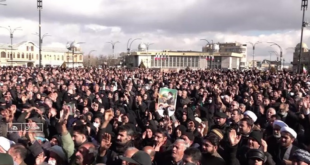Russian President Vladimir Putin is restricting access to a sea that is home to an important Ukrainian port city in an apparent bid to strengthen his military’s ability to threaten those areas, according to NATO officials and Ukrainian observers.
“This would be an unjustified move and part of a broader pattern of destabilizing behavior by Russia,” NATO spokeswoman Oana Lungescu said Friday. “We call on Russia to ensure free access to Ukrainian ports in the Sea of Azov and allow freedom of navigation.”
Putin has tightened control over the Sea of Azov since annexing the Crimean peninsula in 2014, when the Kremlin acquired control of the land on both sides of the Kerch Strait, which connects the Sea of Azov to the wider Black Sea. As Russian forces amass once again on the Ukrainian border, Russian officials announced that they will not allow military vessels to sail in waters near the strait between April 24 and October — a maritime restriction that threatens to isolate the Ukrainian cities and forces stationed along the Sea of Azov.
“Russia is effectively blocking communication between Ukrainian warships between the Black Sea and the Sea of Azov,” the Ukrainian Institute for Security and Law of the Sea’s Bohdan Ustymenko told the Kyiv Post, a Ukrainian media outlet.
President Joe Biden’s administration regards that restriction as a military threat, rather than mere preparation for Russian military exercises, as Kremlin officials claim.
“The United States shares Ukraine’s concerns over Russia’s most recent provocation in the Black Sea, this time, impeding maritime traffic through the Kerch Strait in order to facilitate its continued military buildup,” Chargé d’Affaires Courtney Austrian, the top U.S. diplomat at the Organization for Security and Cooperation in Vienna, said Friday. “Russia’s continued occupation and militarization of the Crimean Peninsula has implications far beyond Ukraine’s borders. It threatens transatlantic security.”
U.S. and European officials have suspected for years that Putin would attempt to gain control of Mariupol, a Ukrainian port city on the Sea of Azov. Mariupol is located in a Ukrainian district between Russia and Crimea, so the shores around the Sea of Azov offer Putin the prospect of a “land bridge” to connect Russia to the peninsula that Russian forces seized in 2014.
“The overwhelming majority in the city of Mariupol, for example, the most important port city for the sea of Azov, is overwhelmingly Russian speaking,” then-Estonian Permanent Secretary Kristjan Prikk, the NATO ally’s top civilian defense official at the time, told the Washington Examiner in 2018. “There are many important military equipment factories there, for, in particular, [the] Navy, but some others as well. Mariupol has strategic significance both for Ukraine and as a target potentially for Russia.”
Russian officials have claimed that their military buildup is simple preparation for military exercises, but Putin’s team has also spoken about intervening in Ukraine to defend Russian speakers — an ominous statement for Ukrainian and NATO observers, who are keenly aware of how Russia invaded Ukraine under false pretenses in 2014.
“Russia has intensified its escalation at sea,” Ukraine’s Ministry of Foreign Affairs said in response to the intended closure. “The behavior of the Russian side indicates the absence of any intention on its part to refuse to continue the aggression against Ukraine using military and hybrid methods.”
Ukrainian officials say that Russian security services tried to “obstruct the legitimate actions of the Ukrainian Navy’s boat group on combat duty” Thursday evening, even though the maritime restrictions aren’t scheduled to begin until next weekend.
Russia seized three Ukrainian naval ships that tried to pass through the Kerch Strait in November of 2018, only to hold the 24 sailors for nearly a year. The latest saber-rattling around Ukraine formed the high-stakes context for Biden’s decision to invite Putin to a summit and also to impose new sanctions on Russia as a punishment for interfering in U.S. elections and conducting cyberattacks against American companies.
Russian Foreign Minister Sergey Lavrov is ordering 10 American diplomats to leave the country, calling it “a tit-for-tat response” to the new U.S. sanctions, but some analysts surmise that Putin’s desire for a meeting with Biden may serve to restrain his aggression toward Ukraine. “If Putin does too much in Ukraine, then there won’t be a summit, and that will be a cost to Putin,” the Atlantic Council’s Anders Aslund said.
Still, NATO officials remain wary of Putin pursuing a significant new offensive. “Russia’s ongoing militarization of Crimea, the Black Sea, and the Sea of Azov are further threats to Ukraine’s independence and undermine the stability of the broader region,” Lungescu said.
 Eurasia Press & News
Eurasia Press & News



